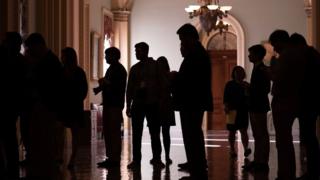US Senate passes sweeping tax overhaul bill
US senators have passed a sweeping tax cuts bill, paving the way for Donald Trump's first big legislative victory.
The final bill was passed 51 to 49 in favour, following a series of amendments in a marathon session.
The plan sees a sharp cut in corporation tax, but a Senate committee finding said it would add $1tn (£742bn) to the budget deficit.
President Trump wants the measures – the biggest US tax overhaul since the 1980s – enacted by the end of the year.
The Senate must now merge its legislation with that passed last month by the House of Representatives.
The reconciled bill will then be sent to the president's desk for his signature to be enacted into law.
- Reality Check: Will tax plan hurt Trump?
- Does the US debt of $20tn matter?
- How does US tax plan compare to other countries?
Democrats complained that the bill would benefit only the wealthy and big business, as well as adding to the US deficit. However, they were unable to muster enough votes to stop it. Senate Republicans have a 52-48 majority.
Republican legislative success at last
Analysis: Anthony Zurcher, BBC News, Washington
The US Senate, a seemingly insurmountable roadblock for the Republican agenda for much of this year, has at last given its assent to a major piece of legislation.
Perhaps not surprisingly, sweeping tax cuts – always beloved by conservatives – is what finally brought the party together and gave President Donald Trump the opportunity to claim a landmark legislative achievement.
It wasn't always pretty. Senate negotiators were handwriting amendments to the massive bill practically up until the final votes were taken. Deals within deals were cut to satisfy recalcitrant legislators. Democrats howled at the permanent cuts provided to corporations, while middle-class taxpayer benefits had sunset clauses.
In the end, however, a combination of hope and fear were enough to drag a slim majority into the yes column. The hope is that a booming economy will give Republicans a chance to run on their tax policy when they stand before voters next November. The fear was that yet another failure would have led to a revolt among the party's big donors and traditional business constituencies.
The House and Senate must now smooth out differences in their bills and vote on the compromise. It's not the end of the race, but the finish line is in sight.
"This bill directs the lion's share of its benefits to those at the very top, the already wealthy and the already powerful," said Senate Democratic leader Chuck Schumer.
He warned that the measures would endanger social security and medical provision.
The final draft of the Tax Cuts and Jobs Act bill went through several changes on Friday in order to bring Republican holdouts on board.
As the day wore on, party leaders sounded increasingly confident that they had the votes to pass the bill.
Republican Tax Plan: What you may have missed
The only Republican senator who refused to back the legislation was Bob Corker.
"I am not able to cast aside my fiscal concerns and vote for legislation that … could deepen the debt burden on future generations," he said.
On Thursday, the nonpartisan Senate Joint Committee on Taxation found that the Tax Cuts and Jobs Act would add significantly to the federal deficit over a decade.
The report contradicted a White House claim that economic growth would compensate for the tax cuts.

